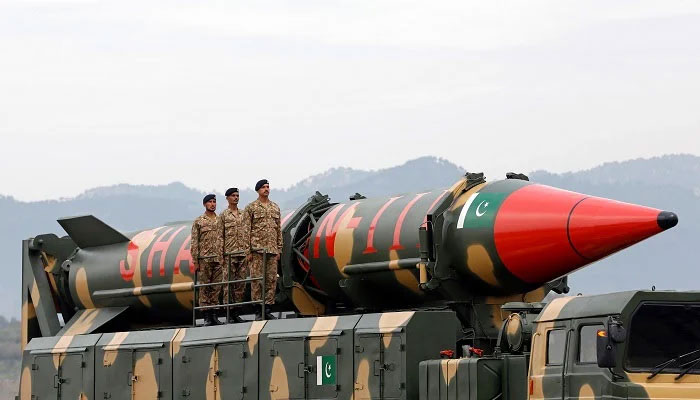Sanctions and sovereignty
FO rightly rebukes these sanctions, terming them “biased” and warning of their dangerous implications for regional stability
The decision by the US to impose yet another round of sanctions related to Pakistan’s ballistic missile programme reflects a troubling pattern of policymaking that fails to account for the complex regional dynamics of South Asia. This marks the third such move in 2024 and the seventh since November 2021 – all justified under the guise of Pakistan’s missile development posing a ‘proliferation threat’. Pakistan’s Foreign Office has rightly rebuked these sanctions, terming them “biased” and warning of their dangerous implications for regional stability. At the heart of the issue lies a glaring double standard. The US has consistently turned a blind eye to India’s rapidly expanding arsenal of long-range ballistic missiles while targeting Pakistan’s strategic capabilities, which exist solely as a deterrent and for the preservation of peace and sovereignty. It is no secret that India initiated the arms race in South Asia. Pakistan was left with no choice but to develop its own defence mechanisms to ensure parity in a region prone to instability.
Yet, the US remains unmoved by this historical reality, favouring India as a strategic ally to counterbalance China’s growing influence. This disregards India’s proliferation activities, which are rarely, if ever, subject to similar scrutiny. Instead, Pakistan bears the brunt of sanctions that, while unlikely to impact its missile programme directly, signal an undercurrent of strategic pressure. Experts largely agree that these sanctions are part of a broader strategy to isolate China. Pakistan’s defence collaborations with China, which have historically bolstered its strategic capabilities, seem to be the underlying trigger. While the US views Pakistan’s close ties with China as a threat to India’s regional dominance, the reality is that Pakistan’s foreign policy seeks balance rather than taking sides in the great-power rivalry between Beijing and Washington. Economic vulnerability only amplifies the impact of these sanctions. Unlike India, Pakistan lacks the economic clout to shrug off such punitive measures. At a time when Islamabad is reliant on international financial institutions like the IMF for economic stability, the US appears to be leveraging Pakistan’s financial constraints to exert undue influence. While the sanctions may not derail Pakistan’s missile development, they risk undermining its already fragile economy, creating long-term challenges.
The path forward must involve a recalibration of US-Pakistan relations. Islamabad needs to clearly convey that its strategic capabilities are not up for negotiation, nor will they be compromised under external pressure. At the same time, Pakistan must emphasise that its partnerships with China and the US are not mutually exclusive. China has been a steadfast ally, supporting Pakistan on international forums and aiding its economic and defence sectors during critical junctures. Making Pakistan choose between Beijing and Washington is not a viable or fair expectation. If Washington genuinely seeks regional stability, it must abandon its selective approach to non-proliferation and strategic partnerships. Diplomacy, not coercion, should guide US policy toward Pakistan. Pakistan, on its part, must focus on strengthening its economy to reduce vulnerabilities to such external pressures. A self-reliant Pakistan will not only be better positioned to resist unjustified sanctions but also to assert its sovereignty more effectively. For now, the message should be clear: respect and balance must underpin any relationship between Islamabad and Washington.
-
 King Charles Secretly Relies On Advice From THIS Royal
King Charles Secretly Relies On Advice From THIS Royal -
 Jennifer Garner Reveals Beauty Choice She Makes As Botox Alternative In Her 50s
Jennifer Garner Reveals Beauty Choice She Makes As Botox Alternative In Her 50s -
 Kate Middleton Drops Four-word Message For Young Girl After Wales Visit
Kate Middleton Drops Four-word Message For Young Girl After Wales Visit -
 Shamed Andrew Uncensored ‘massages’ Should Be Refunded To Public
Shamed Andrew Uncensored ‘massages’ Should Be Refunded To Public -
 Kylie Kelce Reveals Rules She Wants Daughter Bennett To Learn At 3: No More 'passies'
Kylie Kelce Reveals Rules She Wants Daughter Bennett To Learn At 3: No More 'passies' -
 Smartphone Market Set For Biggest-ever Decline In 2026
Smartphone Market Set For Biggest-ever Decline In 2026 -
 Mud, Rain, Loincloths: All About Japan’s 200-year-old Harvest Wrestling Ritual
Mud, Rain, Loincloths: All About Japan’s 200-year-old Harvest Wrestling Ritual -
 Jonathan Majors Set To Make Explosive Comeback To Acting After 2023 Conviction
Jonathan Majors Set To Make Explosive Comeback To Acting After 2023 Conviction -
 Next James Bond: Why Jacob Elordi May Never Get 007 Role?
Next James Bond: Why Jacob Elordi May Never Get 007 Role? -
 Maddox Drops Pitt From Surname In Credits Of Angelina Jolie’s New Film 'Couture' Despite Truce From Father's End In Legal Battle
Maddox Drops Pitt From Surname In Credits Of Angelina Jolie’s New Film 'Couture' Despite Truce From Father's End In Legal Battle -
 Meghan Markle Adds Diamonds To Engagement Ring For Jordan Trip
Meghan Markle Adds Diamonds To Engagement Ring For Jordan Trip -
 Burger King Launches AI Chatbot To Track Employee Politeness
Burger King Launches AI Chatbot To Track Employee Politeness -
 Andrew’s Woes Amid King Charles’ Cancer Battle Triggers Harry Into Action For ‘stiff Upper Lip’ Type Dad
Andrew’s Woes Amid King Charles’ Cancer Battle Triggers Harry Into Action For ‘stiff Upper Lip’ Type Dad -
 Experts Warn Andrew’s Legal Troubles In UK Could Be Far From Over
Experts Warn Andrew’s Legal Troubles In UK Could Be Far From Over -
 Teyana Taylor Reflects On Dreams Turning Into Reality Amid Major Score
Teyana Taylor Reflects On Dreams Turning Into Reality Amid Major Score -
 Jennifer Garner Drops Parenting Truth Bomb On Teens With Kylie Kelce: 'They're Amazing'
Jennifer Garner Drops Parenting Truth Bomb On Teens With Kylie Kelce: 'They're Amazing'




